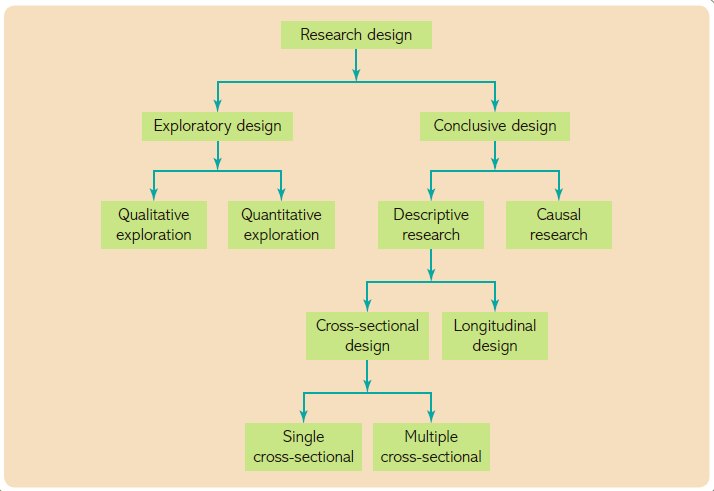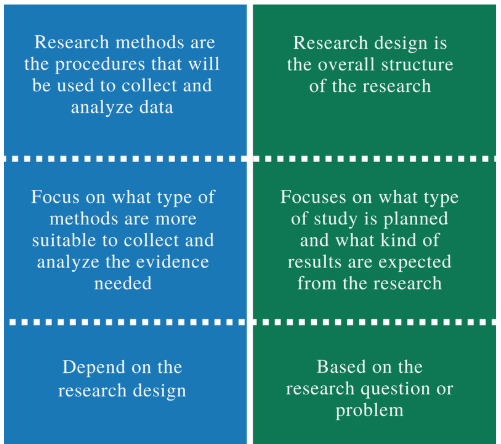Research Methods and Design: When constructing a building there is no point ordering materials or setting critical dates for completion of project stages until we know what sort of building is being constructed. The ®rest decision is whether we need a high-rise office building, a factory for manufacturing machinery, a school, a residential home or an apartment block. Until this is done, we cannot sketch a plan, obtain permits, work out a work schedule or order materials.
Similarly, social research needs a design or a structure before data collection or analysis can commence. A research design is not just a work plan. A work plan details what has to be done to complete the project but the work plan will flow from the project’s research design.
UNIT – II: Research Aptitude (Click below on the topic to read the study notes)
|
Research Design And Research Method
The function of a research design is to ensure that the evidence obtained enables us to answer the initial question as unambiguously as possible. Obtaining relevant evidence entails specifying the type of evidence needed to answer the research question, to test a theory, to evaluate a programme or to accurately describe some phenomenon. In other words, when designing research, we need to ask: given this research question (or theory), what type of evidence is needed to answer the question (or test the theory) in a convincing way?
Research design “deals with a logical problem and not a logistical problem.”
Before a builder or architect can develop a work plan or order materials, they must rest establish the type of building required, its uses and the needs of the occupants. The work plan flows from this. Similarly, in social research, the issues of sampling, method of data collection (e.g. questionnaire, observation, document analysis), design of questions is all subsidiary to the matter of `What evidence do I need to collect?’
So, we can define it as
Research Design is a framework or plan for conducting a research project. It details the procedures necessary for obtaining the information needed to structure or solve research problems.
Types of Research Design (Brief)

Research Methods
Research methods are the strategies, processes or techniques utilized in the collection of data or evidence for analysis in order to uncover new information or create a better understanding of a topic.
Research Methods Vs. Research Design

Types of Research Methods
George J. Mouly has classified research method into three basic types:
- Descriptive or Survey Method
- Historical Method, and
- Experimental Method
Descriptive or Survey Method
It is concerned with the present and attempts to determine the status of the phenomena under investigation. This method has been further classified into four categories:
(a)
(a) Descriptive survey is of four types
- Testing survey method,
- Interview survey method.
(b) Analytical survey is of five types
- Documentary frequency,
- Observational survey,
- Rating survey,
- Critical incident,
- Factor analysis
Historical Method
This method is concerned with the past and which attempts to trace the past as a means for seeing the present perspective.
The his……….
- Documents and various historical sources to which historians have access
- Personal sources of authentic observers and witnesses.
The historical method can be classified into three types:
- Historical
- Documentary
Moreover, the documents which you may study maybe personal documents like biographies, diaries, letters, and memoirs or maybe public documents like magazines and newspapers, and other published data.
Experimental Method
It is oriented towards the discovery of basic relationship among phenomenon as means of predicting and eventually, controlling their occurrence into four types as given below:
1 Simple experimental design
2
3
4 Predictive or correlation
Qualitative Methods and Quantitative Methods
Qualitative Research (QR) is a way to gain a deeper understanding of an event, organization or culture. Depending on what type of phenomenon you are studying, QR can give you a broad understanding of events, data about human groups, and broad patterns behind events and people. While traditional lab-based research looks for a specific “something” in the testing environment, qualitative research allows the meaning, themes, or data to emerge from the study.
Qualitative research uses non-statistical methods to gain an understanding of a population.
Types of Qualitative Research Methods:
- Anthropological
- Face-to-face interviewing
Quantitative Research is about collecting and analysing data to explain phenomena. Information from a sample is used to make generalizations or predictions about a population. Some questions that are easily answered using information from samples include:
- What percentage of high school teachers belong to minority groups?
- How
- Has the high school graduation rate in our district increased over time?
However, data doesn’t always naturally happen in a numerical way. You may want to answer questions like:
- What do high school students think of their teachers?
- What is the general public opinion of health care reform?
- What do customers at a particular business think of customer service?
Methods for Quantitative Research
- Survey
- Secondary data/ databases
- Panel
- Structured Observation
- Experiment
Differences Between Qualitative Method and Quantitative Methods
| Qualitative Methods | Quantitative Methods |
| Methods include focus groups, in-depth interviews, and reviews of documents for types of themes | Surveys, structured interviews & observations, and reviews of records or documents for numeric information |
Ref. : https://egyankosh.ac.in/bitstream/123456789/23391/1/Unit-4.pdf
https://www.orau.gov/cdcynergy/soc2web/content/phase05/phase05_step03_deeper_qualitative_and_quantitative.htm
https://shodhganga.inflibnet.ac.in/bitstream/10603/28106/10/10_chapter%204.pdf
https://egyankosh.ac.in/bitstream/123456789/26098/1/Unit-13.pdf
https://www.statisticshowto.datasciencecentral.com/research-methods-qualitative-research-and-quantitative-research/
https://www.nyu.edu/classes/bkg/methods/005847ch1.pdf
Related Topics
UGC NET Syllabus (Updated): Paper 1 and 2 (Download)
Solved Question Papers of UGC NET Paper 1
UGC NET Study Materials for Paper 1 (Download PDF)
MPhil and PhD Fellowship